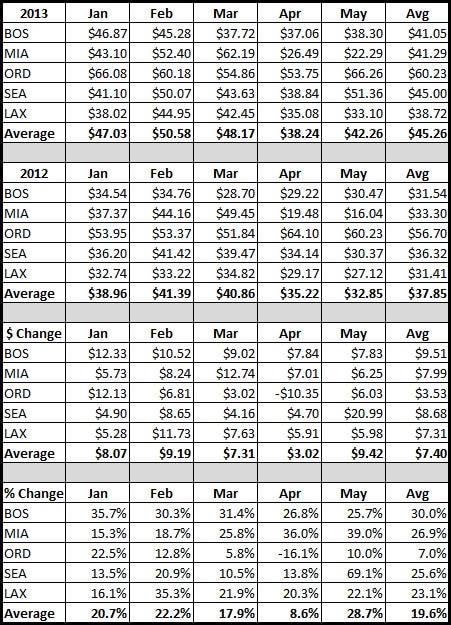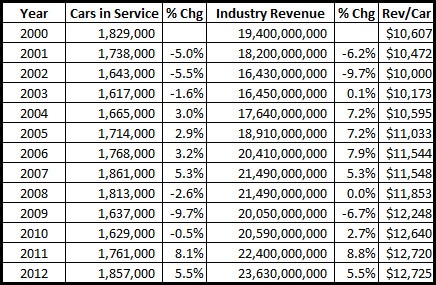High taxes and fees paid by air travelers is frequently cited as being at a higher rate than for cigarettes and alcohol. But all those airline taxes and mandatory fees pale in comparison to the car rental industry where daily rental rates, tax and fee levels have achieved a whole new level of crazy.

At most major airports, the rental cars are not getting wrecked, it’s the traveler’s wallet – even when they get a great deal
Image Credit: boeke cc|flickr
Times have changed. At one time, car rental was perceived as the tail of the travel dog. After considerable consolidation and a comparable reduction in fleets, the car rental industry leadership are happily wagging their tails as higher rental prices are taking a larger slice out of the travel spending pie. But an additional bite is coming from the taxes and fees associated with those airport rentals.
Like the airline industry, the car rental industry recovered from the global financial crisis by consolidating and reducing fleet sizes over three years. Over that same period, the industry managed to increase average annual revenue per car – a growth statistic that has not dipped into negative territory over the last decade.
Avis Budget Group, who acquired Zipcar last year, saw leisure pricing rise 8% in the 1st quarter of 2013. Hertz has achieved record year-over-year adjusted pre-tax income for seven consecutive quarters – helped along by its smooth acquisition of Dollar Thrifty Group. Recovering from the Global Financial Crisis, privately held Enterprise Holdings – parent of the Enterprise, Alamo and National Car Rental groups – booked record revenues and earnings for the third consecutive year in 2012.
In case you might not have noticed, these nine major car rental brands Avis, Budget, Zipcar, Hertz, Dollar, Thifty, Enterprise, Alamo and National are owned by just three entities. Those three groups also comprise 98% of US airport rental car market share.
The US rental car industry does have some smaller groups – Ace, Economy, E-Z, Fox, Payless, Sixt, U-Save and Advantage (which was divested by Hertz as part of the the Dollar/Thrifty acquisition) are regional players, but lack distribution across all US airports like the majors.
With consolidated control over supply, The rental car industry is now beginning to flex its muscles. Below is a table showing the trend of the number of US rental cars in service and the associated revenues over the past decade.
Seeing macro industry numbers is one thing, but what does this look like to travelers out in the real world? Auto Rental News is in the process of expanding its tracking of car rental rates, but a sample of five airports provides some perspective.
The chart below compares average rental car rates the first five months of 2013 against the first five months of 2012. The degree of rate growth is breathtaking.

Rental Car Rate Comparison at Five US Airports – 1st Five Months of 2013 v. 2012
Source: Auto Rental News
With the exception of two months at Chicago O’Hare, all five markets displayed double-digit rate growth. When averaged year to date, the other four markets all averaged increases exceeding 20% year over year.
And more is coming. While corporate rates remained flat in 1Q 2013, Avis Budget Group now forecasts an across the board 4% rate increase that will generate $120 million in incremental earnings – not bad for popping the price only an average $1.60 per car rental day.
My money says that Avis Budget Group beats those rate growth projections in 2013, unless the economy implodes during the last half of the year.
A Taxing Question
It is one thing for rental car rates to rise, but that is only a portion of the story. When travelers pay for their rental cars, a gaggle of taxes, mandatory fees and sundry charges are added to the tally.
So how do these various strategies manifest themselves? I had the opportunity to rent a car in Seattle recently, so I learned first-hand.
Despite the aggressive rate growth previously referenced, I managed to score a mid-week rate of $14.00 per day for a mid-size car from E-Z Rent-a-car. Conveniently, they were even located in the brand new, $400 Million, SeaTac car rental facility with all the other rental car companies.
Little to my surprise, when I reviewed my reservation, there were a few additional fees added to the base rate. To be fair to the E-Z Rent-a-car folks, there were a couple of fixed daily fees that boosted the tax/fee ratio, but the end result was remarkable.
| 3 Day Rental – SEA | Daily | Rental | % Base |
| Base Rental | |||
| Daily Rate | $14.00 | $42.00 | |
| Rental Subtotal | $14.00 | $42.00 | 100.0% |
| Taxes & Charges | |||
| Concession Recovery Fee | $1.78 | $5.33 | 12.7% |
| Sales Tax | $4.09 | $12.26 | 29.2% |
| Customer Facility Charge | $6.00 | $18.00 | 42.9% |
| Vehicle License Fee | $1.99 | $5.97 | 14.2% |
| Total Taxes & Charges | $13.85 | $41.56 | 99.0% |
| Total Rental Charge | $27.85 | $83.56 |
99% of the base rental price for taxes & fees caught my attention. One seriously must question exactly what is happening if the taxes and fees are equivalent the product being purchased…
NOTE: Further research revealed a $14.00 economy car at Boston Logan Airport, with $21.44 in fees, yielding a whopping tax & fee rate exceeding 153%.
For the Seattle booking, the total price was still a deal. It was less than a third when compared with the aggressive rates charged by the price-leading brands National, Avis and Hertz. Maybe I shouldn’t complain, but curiosity go the best of me – I needed to know how those taxes & fees got so high.
On the surface, while very high, some of the fees might be logically rationalized. The new rental facility was expensive to build, so a 12.7% Concession Recovery Fee, plus a $6.00 per day seemed high, but within the realm of possibility.
Similarly, the 29.2% Sales Tax rate appeared extreme, but lots of cities have gotten away with funding stadiums and tourist districts through taxes on those not residing as voters in their local jurisdictions.
The $1.99 per day Vehicle Licensing Fee also looked outrageous, but maybe the Washington State Department of Transportation had a grudge against car rental agencies. At least there weren’t any of those ridiculous Energy Recovery or Frequent Flyer Mileage assessments that have annoyed me with other car rental companies at other airports.
There was only one problem. I decided to check the official fee and tax rates with Mr. Perry Cooper, Airport Media Officer for the Port of Seattle – the agency responsible for operating Seattle-Tacoma International Airport.
Cooper’s figures did not exactly align with those assessed by E-Z Rent-a-car:
- Washington State Sales Tax is 9.5%
- Washington State Rental Car Tax is 6.7%
- County Tax is 1.0%
- SeaTac’s Concession Fee is 11.1%
- Customer Facility Fee is $6.00 per day
This results in a total tax subtotal of 17.2% – not the 29.2% charged on my rental receipt.
It’s hard to say what else the 12.7% assessment might be recovering.
Thank God they finally got one right…
So calculating the overages, it appears that $5.71 of tax or fee recovery charges were collected that was not supported by state or airport policy.
Math Majors Wanted
One might best describe these as anomalies. Maybe this was just an isolated instance. A single rental or a single car rental group having system issues over this specific rental period.
That theory proved to be incorrect.
Imagining I would be singling out E-Z Rent-a-car alone for some unscrupulous practices, I then compared rental car rates and their associated fees across all the rental car companies serving SeaTac Airport over two separate date ranges. The distressing results are listed below (click the table to see full-size table.)

Detailed Tax Inclusive Rental Car Pricing Comparison
Click Image to see larger version of table.
Source: RockCheetah Research
The findings:
The eleven rental car companies surveyed that serve Seattle’s airport are overstating their tax liabilities and overcharging travelers. Instead of the official 17.2% aggregate tax rate, over the example itinerary, the taxes assessed ranged from 19.1% (Dollar) to 22.72% (E-Z)
Only Dollar charged the correct 11.1% Concession Recovery Fee – the others charged between 11.13% (National) and 11.67% (E-Z.) These were not simple rounding errors.
Again, ALL of the rental agencies got the $6.00 Customer Facility Fee correct.
A defense of “employee error” is ludicrous as the variances apply to a large number of car rental groups and NONE of the errors worked in the favor of the consumer.
Another curious observation is the relationship between the taxes and their descriptions.
In the case of Fox Rent-a-Car, the tax and fee details listed on their website for a Seattle economy car rental correctly lists the Concession fee as 11.1%, but the calculated dollar amount comes out to 11.19%; State sales tax is described at 9.5%, but the number is again calculated incorrectly at 10.6%; the same applies to state rental tax, properly described as 7.7% (including county tax), but actually charged at 8.6%.
Interestingly, Enterprise, Alamo & National all break out the Sports Facility Tax and Regional Transit Tax that totals 2% of the base rental rate. These taxes were assessed to construct Safeco Field, home of the Seattle Mariners baseball team. I use the past tense intentionally because this tax was abolished in October of 2011.
The basis for the Vehicle License fee appeared to differ by agency, but every single one charged for it. E-Z again easily led the pack with its $1.99/day charge. The others ranged from $0.30 (Thrifty) to $0.80 (Hertz) per day or between 0.27% (Avis) and 0.63% (Advantage & Hertz.)
While rental car companies are allowed to recover costs incurred in the State of Washington to license, title, register, plate, and inspect rental cars, those fees must represent a good faith estimate of actual costs, or the fees need to be lowered the following year by any excess amount collected. In E-Z’s case, unless their cars have exceptionally low utilization, renters can expect lower vehicle licensing fees next year.
Humanely, E-Z and the three Enterprise owned brands (Alamo & National) did not charge an Energy Recovery fee. Neither did Dollar, but strangely, sister company Thrifty did… Advantage & Hertz charged $1.03/day, while Fox, Budget & Avis all charged $0.60/day and Thrifty trailed at $0.45/day.
Budget explains its rationale for the fee: “To help recover the escalating energy costs related to our business operations, we must also impose a separately stated Energy Recovery Fee (ERF) to all customers at all locations.” The national fee appears to be 0.60/day.
Unfortunately, this does not appear to be uniformly applied, as a quick check of the Budget website revealed that there is no fee associated with rentals at New York’s LaGuardia Airport, or Dallas/Fort Worth International Airport. However, for some reason, Boston gets socked with a $0.79 fee per day.
I sincerely hope someone will someday be able to provide a more rational explanation for the Energy Recovery fee. As it is a “recovery fee,” I am wondering, has ever been an audit? According to the Avis Budget Group 2012 10-K, the North America Division had 86 million rental days. At $0.60 per rental, that comes to $51.6 million. That’s a lot of energy.
Considering Budget employs 18,000 staff in North America, if my calculations are correct, that comes out to an average energy cost of $2,866 per employee. That might be enough to cover the monthly heating and air conditioning bills for each of those employee’s private residences…
The Bottom Line
So, despite the strength of rental car demand relative to supply, it appears the rental car companies are greedily getting a bit fast & loose with their tax and fee calculations – at least in Seattle.
I’m no lawyer, but charges of felony theft of sales taxes is not something rental car companies want to mess with. Federal trade commission deceptive pricing claims and class action lawsuits on behalf of consumers are a couple other undesirable distractions. There should ultimately be some good explanations why these anomalies relating to the accurate description and calculation of sales taxes and fees occur.
When it comes to booking a rental car, consumer beware – always comparison shop based on the total price inclusive of taxes and fees. I never buy the Collision Damage Waiver and all the other coverages as my personal auto insurance covers it (check if yours does too.) I also always return the car full of gas to avoid the legalized extortion known as refueling charges.
Additionally, if staying at a hotel, it will be important to understand fees for overnight parking (and whether in & out charges may apply.) With car rental rates rising, for short flights, it might be cheaper to drive. Regardless, when daily economy car rental rates exceed $100 per day, that takes a lot of cabs and/or shared rides to cover those costs.
Finally, as the the charges on a car rental receipt may not match their respective descriptions, doing a quick calculation check – particularly for longer rentals – might be a good idea.





